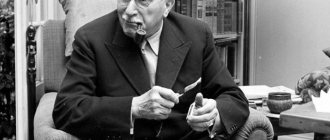Personality
From the very beginning, Leontief introduced into these works a fundamental departure from the views of most of his contemporary psychologists.
“In the ordinary, worldly understanding,” writes A.N. Leontiev in his Methodical Notebooks is what controls individual processes of activity and behavior. This is the “master” of processes. Leontyev believes that this is a common way of thinking. Actually, no: Personality is not a special quality or interconnection of mental processes, it has a different nature: “The problem of personality is a problem of unity, the interconnection of individual activity.”
The difference between these formulations is very significant. The interconnection of mental processes is what relates to mental reality. Thus, we classify personality as a general category of the psyche; personality turns out to be one of the structures of the psyche. A.N. Leontiev, on the other hand, fundamentally takes the concept of personality beyond the concept of the psyche to the level of relations with the world; as he later put it, “the problem of personality forms a new psychological dimension: a new one, different from the dimension in which the study of this or that mental process occurs.” This position, coming from Vygotsky, fundamentally distinguishes the approach of A.N. Leontyev from the views of A.F. Lazursky, S.L. Rubinshteina, V.S. Merlin and almost all other domestic and foreign authors. According to the ideas of A.N. Leontiev, personality is a special reality that deserves special attention: “Personality is not a simple biological being, it is a higher essence, historical (social) nature.” This unity, identity, is not given initially. A person is not born as an individual. A person’s personality arises in the process of development of his life.”
Thus, Leontiev defines personality as a context, a hierarchy of activity, and not mental processes. “A person becomes a person... during his biography. In this sense, personality is a “blood clot” of biography.” In other words, personality is neither biological, nor social, nor conditions, nor factors, but is a biography, life experience! Personality is the result of the “crystallization” of biography. This is the first dissertation of A.N. Leontyev.
The second thesis: personality develops, that is, there are qualitatively special stages of personality development that have nothing to do with the development of mental processes. The third thesis: personality has a structure. At the very beginning, a distinction is introduced between man and personality. If a person is a type of biological formation, a unit of natural organs and their functions, then a person is a non-biological entity. It arises gradually and takes shape throughout life, so that a personality structure emerges and at the same time a personality independent of the personality.
Indeed, the same general idea, albeit in slightly different terms, is echoed in Activity more than three decades later. Consciousness. Personality." Leontyev begins his analysis of personality with the important thesis that personality is not everything in a person. There is something that has nothing to do with personality, and there is something that does, but it is not known in advance. “The same characteristics of a person can have different relationships with their personality.” Our task, writes A.N. Leontiev, “requires us to understand personality as a psychological reformation that is formed in the life relationships of the individual.” Everything else - both natural and social - is a necessary condition for the development of personality, from which development itself cannot be derived.
Personality first arises when a person enters history, and he becomes a person only as a subject of social relations. “A person’s personality in no way exists in relation to his activity, since his consciousness is generated by him.”
Position of A.N. Leontiev’s approach to personality as an “internal moment” of activity caused a lot of criticism, in which he was accused of allegedly reducing personality to activity, thereby depriving it of specificity. However, Leontyev never said that personality is simply a moment of activity. The meaning of this thesis is that activity has an “object-subject” structure; it cannot occur without a subject, who is a person. Activity consists of motives, and motives are associated with personality, but not with personality.
Life crises affecting personality development
Some theories of personality development emphasize that adulthood and aging are periods of change and transformation of previous life patterns. These changes are thought to occur in the context of social status and are influenced by family, workplace and society as a whole.
Society sets standard boundaries and expectations for a growing person, which provokes various psychological crises.
For example, an adult is expected to play the role of a productive member of society: enroll in a university, and then get an official job. The situation goes beyond when a girl decides to get married and gets pregnant, and the guy prefers remote work, and even evades taxes. Failure to develop productive self-esteem and meet expectations leads to feelings of stagnation and disrupted worldview. Thus, young mothers on maternity leave have a decrease in self-esteem, they lose a sense of significance (although they are extremely significant for their child).
The age range from 28 to 33 years represents the transition between the period of entry into the adult world and the next period of settling. This transition provides an opportunity to adjust and enrich the temporary structure of adult life that he previously created.
For most men, moderate to severe crises are common. Divorces and career changes are common at this time.
This is followed by a period of calm, which begins in the early 30s and continues until about 40 years of age. This period during which the primary task is to become a full-fledged adult, to ensure stability and security for yourself and your loved ones. A person takes on deeper obligations to his profession and family. In addition, he often focuses on his goals, engages in long-term planning and achieves results.
Most men focus on a key life event, such as a promotion, for the ultimate social affirmation. The priority is independence and authority.
The midlife transition period lasts from four to six years, peaking in the early 40s. It forms the link between early and middle adulthood and represents the meeting of the past and the future.
During this period, the main task is to work and partially resolve the discrepancy between what is and what could be.
The period of entry into middle adulthood begins at approximately 45 years of age and continues until approximately 50 years of age. The transition to a mature personality is usually accompanied by significant upheavals. Sometimes accompanied by a significant life event, such as a job change, divorce or love affair.
In adulthood, there is a crisis regarding the sense of ego integrity versus the sense of despair. At this stage, people realize that they are approaching the end of their lives. If they have successfully completed the previous stages of development, they will be satisfied that they have lived a full, fulfilling life. People who lack integrity in life often experience a sense of despair over “lost” opportunities.
Personal development. Personality and biography
Man is a combination of natural organs and their functions, resulting from the differentiation and at the same time integration of living circuits. It is the connection of natural needs that determines the natural hierarchy of activity. Personality, on the other hand, is “the connecting link of a hierarchy of activity, not biological, but historical.” It is determined by the process of differentiation of activity and its resubordination; a new hierarchy, new, secondary, higher connections arise.
This thesis clearly shows continuity with Vygotsky’s line. In his opinion, in addition to natural functions, there are also higher human functions. They appear in life, become individual, move from the interpersonal space to the intrapersonal one (this is the essence of the internationalization process). Personality is formed in the process of individual history, in the process of communication with other people.
Below is the section “Philogeny of personality. “The original personality...” writes Leontiev, “is not yet an individual personality.” The people of the primitive clan society... are not yet... "separated from the umbilical cord of the primitive society." They form a kind of unified whole. Historically, personality develops as the separation and autonomization of individuals from the primary total personality. Initially, a community, a social group is a single personality, then an autonomous personality gradually crystallizes from it.
The following main thesis characterizes the direction of personal development: from “action to satisfy one’s natural needs and calls” to “satisfying one’s needs, to act, to fulfill one’s life task, to fulfill one’s vital human goals.” The cause-and-effect structure is reversed: first actions for needs, then needs for actions.
Personality theory was actively developed by A. N. Leontiev.
The main provisions of this theory can be summarized as follows.
According to the researcher, a personality is not just a person with a certain life experience, but a person whose development is associated with the formation of a motivational sphere. A person can be recognized as a person to the extent that the totality of his motives is determined by the needs of society. The quality and scale of the values that a person assimilates and accepts determine the quality and scale of his personal characteristics.
A. Leontyev identified the stages of personality development, which, as a rule, are reflected in the figurative expression of the researcher: “a personality is born twice.”
"First birth" of personality
The “first birth” occurs in preschool age and marks the formation of the first hierarchically structured relationships and motives, the first subordination of unconscious motives and impulses to the norms of the social order (“bitter candy effect”).
You can determine the time frame for the “birth of the first child”: It begins at about 3 years old and continues until primary school age. Thus, it is not a simultaneous process, but a long process.
The main criterion for the existence of this stage in the process of personality formation is the individual’s acceptance of the norms and values of the social structure as the main motives of behavior. An external manifestation of such acceptance is, for example, the child’s ability to “not take” a desired object simply because the adult who is raising him has forbidden it. It is important that this ability comes into play even when the child is alone with the object in question - the child must understand that the object must not be picked up under any circumstances. When a child is able to subordinate desires to the orders of an adult in this way, we can say that the social norm, which acted as an external regulator of the child's activities (i.e., the parent had to repeat his demands), has turned into an internal form of regulation.
Separately, it is necessary to describe the “bittersweet effect” identified during one of Leontiev’s experiments. This investigation involved a preschool child. The essence of the experiment was summarized as follows. The child was given the task of picking up an object from the table without leaving the room, while the table was located at a considerable distance from the child. Each time the child received candy for successfully completing the task. During this time, while the adult controlled the process, the child completed the task as needed - without getting up. In the middle of the experiment, the adult was allegedly asked to leave the room for a moment, and he left (in fact, he was watching the child from the next room). Once the child was left alone to pick up the item, he simply stood up from his seat, walked over to the item, and took it. The adult, who returned to the room and found the object in the child’s hands, offered him a piece of candy to help him complete the task correctly. But the child initially refused the reward, and when the adult insisted, he cried quietly.
A. N. Leontyev proposed the following explanation of the phenomenon. Each child’s action objectively fits into a system of special relationships with the surrounding reality. One of these relationships is the “child-adult” relationship, the other is the “child-subject” relationship. And since any relationship of a subject to an object can be realized only in the form of the activity of this subject, driven by a certain motive, A.N. Leontyev notes that the child’s action correlated differently with two significant motives: the desire to take the object (since a reward is expected for it), but it is difficult to obtain it in a socially approved way (and the child at this age tries to meet the expectations of adults). When the experimenter returned to the room and offered a reward for solving the task “correctly,” the child experienced a motivational conflict, making the candy “bitter” for him in a personal sense.
This experiment proved that the child began the process of co-subordination of motives, and socially significant motives, reflecting compliance with social norms, seem to be the most important.
Stages of personality formation
Personality formation begins at birth. This is a long and complex process that occurs in several periods (stages):
Infancy - 0-2 years
At this stage, the baby begins to learn to trust or not to trust. If he is well cared for and loved, he will begin to develop a sense of security and a positive outlook on life. Otherwise, the child will feel unprotected, and the first childhood fears will begin to develop.
Toddler stage - 18 months to 3 years
At this age, the child begins to develop will. With proper upbringing, a child gains self-confidence. Parents will have to go through stubbornness and the first big crisis.
Preschool stage - from 3 years
Some call this stage "playing age." The child begins to develop initiative. He begins to use his imagination and understand how to lead and follow others.
School age stage
At this stage, the child develops basic intellectual skills. He understands how to communicate with peers and knows how to manage communication, and is flexible in different companies.
Adolescent stage
At this stage, a set of values is formed that will help in life. The child's brain becomes more specialized and efficient, productive.
17 years
Abstract thinking is formed, areas of the prefrontal cortex of the brain are formed. In the figure, these zones are highlighted in dark blue and purple. The development of these areas leads to a surge in social activity and expression of emotions among older adolescents. They begin to assess risks, exercise self-control, and plan for their future.
21 years old
At this age, higher mental functions are formed. But a person still cannot control his emotions and make decisions rationally, as can be seen from the small green areas in the figure. These skills are formed only by the age of 23.











